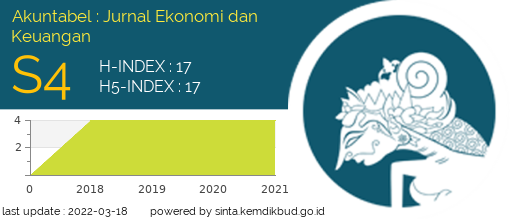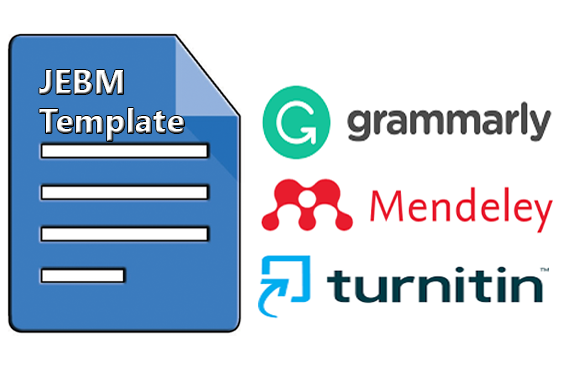Keterkaitan antara keterlibatan karyawan, dan kinerja karyawan: kreativitas karyawan sebagai variabel mediasi
Abstract
Penelitian ini bertujuan untuk mengetahui tentang pengaruh keterlibatan dan kreativitas karyawan terhadap kinerja karyawan. Populasi dalam penelitian ini adalah karyawan biro perjalanan di Kota Palembang dengan sampel berjumlah 82 orang. Teknik Convenience sampling digunakan dalam penelitian ini. Teknik analisis data yang digunakan penelitian ini adalah model kausalitas atau menguji hubungan antara varaibel independen dengan variabel dependen dengan teknik analisis yang digunakan adalah analisis jalur. Hasil analisis data menjelaskan bahwa hubungan antara variabel keterlibatan kerja dengan kreativitas karyawan dinyatakan positif dan signifikan. Hubungan antara variabel keterlibatan kerja dengan kinerja karyawan dinyatakan positif dan signifikan. Kemudian, hubungan antara variabel kreativitas karyawan dengan kinerja karyawan dinyatakan positif dan signifikan. Hasil penelitian ini dapat dijadikan sebagai rujukan bagi pengelola biro perjalanan dalam pengelolaan karyawan.
Keywords
Full Text:
PDF (Bahasa Indonesia)References
Ahmetoglu, G., Harding, X., Akhtar, R., & Chamorro-Premuzic, T. (2015). Predictors of Creative Achievement: Assessing the Impact of Entrepreneurial Potential, Perfectionism, and Employee Engagement. Creativity Research Journal, 27(2), 198–205. https://doi.org/10.1080/10400419.2015.1030293
Alfes, Kerstin, Truss, Catherine, Soane, C, Emma, Rees, Chris, Gatenby, M. (2013). The relationship between line manager behavior, perceived HRM practices, and individual performance: examining the mediating role of engagement. Human Resource Management, 52(6), 839–859. https://doi.org/10.1002/hrm
Badal, S., & Harter, J. K. (2014). Gender Diversity, Business-Unit Engagement, and Performance. Journal of Leadership and Organizational Studies, 21(4), 354–365. https://doi.org/10.1177/1548051813504460
Bagheri, G., Esmaili, M., & Abasi, A. (2013). Analysis the Effect of Individual Creativity on the Employees Engagement at Work : Case Study : Agriculture Organization of Qom. International Journal of Accounting Research, 1(2), 8–17. https://doi.org/10.12816/0001129
Bakker, A. B., & Bal, P. M. (2010). Weekly work engagement and performance: A study among starting teachers. Journal of Occupational and Organizational Psychology, 83(1), 189–206. https://doi.org/10.1348/096317909X402596
Carter, W. R., Nesbit, P. L., Badham, R. J., Parker, S. K., & Sung, L. K. (2018). The effects of employee engagement and self-efficacy on job performance: a longitudinal field study. International Journal of Human Resource Management, 29(17), 2483–2502. https://doi.org/10.1080/09585192.2016.1244096
Christian, M. S., Garza, A. S., & Slaughter, J. E. (2011). Work engagement: A quantitative review and test of its relations with task and contextual performance. Personnel Psychology, 64(1), 89–136. https://doi.org/10.1111/j.1744-6570.2010.01203.x
Dajani, Zaki, Ahmed, M. (2015). the Impact of Employee Engagement on Job Performance : Case Study for Banks in Lebanon. International of Business and Management Sciences, 3(5), 138–147. https://doi.org/10.12691/jbms-3-5-1
Eldor, Liat, Harpaz, I. (2016). Predicting Marital Happiness and Stability from Newlywed Interactions Published by : National Council on Family Relations Predicting Marital Happiness and Stability from Newlywed Interactions. Journal of Organizational Behavior, 37(1), 213–235. https://doi.org/10.1002/job
Eschleman, K. J., Madsen, J., Alarcon, G., & Barelka, A. (2014). Benefiting from creative activity: The positive relationships between creative activity, recovery experiences, and performance-related outcomes. Journal of Occupational and Organizational Psychology, 87(3), 579–598. https://doi.org/10.1111/joop.12064
Harter, J. K., Schmidt, F. L., & Keyes, C. L. M. (2004). Well-being in the workplace and its relationship to business outcomes: A review of the Gallup studies. Flourishing: Positive Psychology and the Life Well-Lived., (January), 205–224. https://doi.org/10.1037/10594-009
Hon, A. H. Y. (2012). Shaping environments conductive to creativity: The role of intrinsic motivation. Cornell Hospitality Quarterly, 53(1), 53–64. https://doi.org/10.1177/1938965511424725
Ibrahim, M., & Al Falasi, S. (2014). Employee loyalty and engagement in uae public sector. Employee Relations, 36(5), 562–582. https://doi.org/10.1108/ER-07-2013-0098
J., A. (2014). Determinants of employee engagement and their impact on employee performance. International Journal of Productivity and Performance Management, 63(3), 308–323. https://doi.org/10.1108/IJPPM-01-2013-0008
Janssen, O., & Giebels, E. (2013). When and why creativity-related conflict with coworkers can hamper creative employees’ individual job performance. European Journal of Work and Organizational Psychology, 22(5), 574–587. https://doi.org/10.1080/1359432X.2012.669524
Karatepe, O. M., & Ngeche, R. N. (2012). Does Job Embeddedness Mediate the Effect of Work Engagement on Job Outcomes? A Study of Hotel Employees in Cameroon. Journal of Hospitality Marketing and Management, 21(4), 440–461. https://doi.org/10.1080/19368623.2012.626730
Kim, W. (2017). Examining Mediation Effects of Work Engagement Among Job Resources, Job Performance, and Turnover Intention. Performance Improvement Quarterly, 29(4), 407–425. https://doi.org/10.1002/piq.21235
Kim, W., Kolb, J. A., & Kim, T. (2013). The Relationship Between Work Engagement and Performance. Human Resource Development Review, 12(3), 248–276. https://doi.org/10.1177/1534484312461635
Koopmans, L., Bernaards, C. M., Hildebrandt, V. H., De Vet, H. C. W., & Van Der Beek, A. J. (2014). Construct validity of the individual work performance questionnaire. Journal of Occupational and Environmental Medicine, 56(3), 331–337. https://doi.org/10.1097/JOM.0000000000000113
Macey, W. H., & Schneider, B. (2008). The Meaning of Employee Engagement. Industrial and Organizational Psychology, 1(1), 3–30. https://doi.org/10.1111/j.1754-9434.2007.0002.x
Rich, B. L., Lepine, J. A., & Crawford, E. R. (2010). Job engagement: Antecedents and effects on job performance. Academy of Management Journal, 53(3), 617–635. https://doi.org/10.5465/amj.2010.51468988
Schaufeli, W. B., Bakker, A. B., & Salanova, M. (2006). The measurement of work engagement with a short questionnaire: A cross-national study. Educational and Psychological Measurement, 66(4), 701–716. https://doi.org/10.1177/0013164405282471
Shuck, B., & Reio, T. G. (2014). Employee Engagement and Well-Being: A Moderation Model and Implications for Practice. Journal of Leadership and Organizational Studies, 21(1), 43–58. https://doi.org/10.1177/1548051813494240
Slåtten, T., & Mehmetoglu, M. (2011). Antecedents and effects of engaged frontline employees: A study from the hospitality industry. Managing Service Quality, 21(1), 88–107. https://doi.org/10.1108/09604521111100261
Taboli, Hamid, Zaerizadeh, M. (2016). Examine the effect of individual creativity on job performance with the mediating role of ethical leadership of headquarters staff of Hormozgan University of Medical Sciences. International Business Management, 10(8), 1427–1433.
Zhou, J., & George, J. M. (2001). When job dissatisfaction leads to creativity: Encouraging the expression of voice. Academy of Management Journal, 44(4), 682–696. https://doi.org/10.2307/3069410
DOI: https://doi.org/10.30872/jakt.v17i2.7368
Refbacks
- There are currently no refbacks.
Copyright (c) 2020 Yusleli Herawati, A. Jalaludin Sayuti, Gst. Ayu Oka Widarti, Heri Setiawan
Editorial Address
Akuntabel: Jurnal Akuntansi dan Keuangan
Faculty of Economics and Business, Mulawarman University
Jl. Tanah Grogot No.1 Samarinda Kalimantan Timur 75119
Email: jakt.feb.unmul@gmail.com
StatCounter: Akuntabel: Jurnal Akuntansi dan Keuangan






